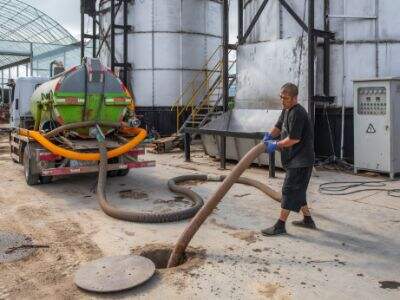আধুনিক খেত আগেকার খেতের চেয়ে অনেক আলাদা। এই নতুন প্রযুক্তির সাহায্যে কৃষকদের পক্ষে বেশি খাদ্য উৎপাদন করা এবং কম অপচয় করা সম্ভব হয়েছে।
ক্ষেত থেকে কীভাবে বেশি খাদ্য উৎপাদন করা যায়
কৃষকরা বুদ্ধিমান কৃষি প্রযুক্তি ব্যবহার করে বেশি ফসল জন্মাচ্ছেন। এটি যান্ত্রিক ইঞ্জিনিয়ারিং কৃষকদের ফসলের নিকট থেকে পর্যবেক্ষণ করতে এবং প্রয়োজন মতো সামঞ্জস্য করতে সাহায্য করে। উদাহরণস্বরূপ, সেন্সরের মাধ্যমে কৃষকরা মাটির আর্দ্রতা মাপতে পারেন এবং যখনই ফসলের জলের প্রয়োজন হয় তখন স্বয়ংক্রিয়ভাবে জল দিতে পারেন। এর ফলে গাছগুলি ভালো জন্মানোর জন্য নিয়মিত জল পায় এবং বেশি পরিমাণে খাদ্য উৎপাদন হয়।
ফসল ভালোভাবে জন্মানোর জন্য ডেটা ব্যবহার
কৃষকদের খাদ্য উৎপাদন বাড়ানোর আরেকটি উপায় হলো তথ্য থেকে ভালো সিদ্ধান্ত গ্রহণ করা। তাঁরা আবহাওয়া, মাটি এবং কীটপতঙ্গদের তথ্য থেকে সঠিক বুদ্ধিমত্তা অর্জন করেন। তাই যদি কোনও নির্দিষ্ট কীট তাঁদের ফসলের ক্ষতি করে এমন খবর তাঁদের জানা থাকে, তাহলে তাঁরা সেই ফসলের রক্ষা করতে পারেন। এটি শুধুমাত্র তাঁদের বেশি খাদ্য উৎপাদনের সুযোগ করে দেয় না, বরং কীটপতঙ্গজনিত ক্ষতি থেকে খাদ্য নষ্ট হওয়াও কমায়।
স্মার্ট ফার্মিংয়ের মাধ্যমে পরিবেশ রক্ষা করা
স্মার্ট ফার্মিং পদ্ধতি কৃষকদের পরিবেশ রক্ষায় সাহায্য করে। তাঁরা প্রিসিজন নামে পরিচিত বিশেষ পদ্ধতি অবলম্বন করেন কৃষি । এর মধ্যে ফসলের উন্নত তত্ত্বাবধানের জন্য জিপিএস এবং ড্রোনের মতো যন্ত্রপাতি ব্যবহার করা হয়। এই প্রযুক্তির সাহায্যে কৃষকরা সার এবং কীটনাশক আরও সঞ্চয়ে ব্যবহার করতে পারেন, যার ফলে প্রকৃতিতে রাসায়নিক দ্রব্যের পরিমাণ কমে যায়। জমির যত্ন নেওয়ার মাধ্যমে কৃষকরা নিশ্চিত করতে পারেন যে ভবিষ্যতের প্রজন্মগুলির জন্য এটি স্বাস্থ্যকর থাকবে।
একটি টেকসই ভবিষ্যতের নির্মাণ
স্থিতিশীলতা আজকের কৃষকদের জন্য একটি বড় ফোকাস, এবং স্মার্ট চাষের সিস্টেমগুলি তাদের সহায়তা করছে। কৃষিতে প্রযুক্তি ফসল ব্যবস্থাপনার মাধ্যমে কৃষকদের কম জল এবং শক্তি ব্যবহার করতে সাহায্য করতে পারে। এটি পরিবেশ রক্ষার জন্য হল যা অনেক বছর ধরে জমিকে স্বাস্থ্যকর এবং উৎপাদনশীল রাখে। Tplus-এ, আমরা বুদ্ধিদু্যন্ধ সমাধান সরবরাহ করতে উচ্ছ্বসিত যা স্থিতিশীল কৃষিতে এবং আমাদের বিশ্বকে রক্ষা করার ক্ষেত্রে অবদান রাখে, সেই সঙ্গে আরও বেশি খাদ্য উৎপাদন করা।
দক্ষতা এবং লাভ বৃদ্ধি
আরও খাদ্য উৎপাদন এবং অপচয় কমানোর পাশাপাশি, স্মার্ট ফার্মিং সিস্টেমগুলি কৃষকদের আরও ভালভাবে কাজ করতে এবং আরও বেশি অর্থ উপার্জন করতে সাহায্য করে। সেচ এবং সার প্রয়োগের মতো কাজ স্বয়ংক্রিয় করে কৃষকরা সময় এবং পরিশ্রম বাঁচান। এটি তাদের খামারের অন্যান্য দীর্ঘমেয়াদী, কৌশলগত দিকগুলি, যেমন তাদের পণ্য বিক্রি করা সম্পর্কে মনোনিবেশ করতে সক্ষম করে। কেবলমাত্র আরও দক্ষ হয়ে ওঠার মাধ্যমে কৃষকরা তাদের ব্যবসাকে শক্তিশালী এবং সমৃদ্ধ রাখতে পারেন।

 EN
EN
 FR
FR
 DE
DE
 IT
IT
 AR
AR
 HR
HR
 DA
DA
 NL
NL
 FI
FI
 HI
HI
 JA
JA
 KO
KO
 PT
PT
 RU
RU
 ES
ES
 SV
SV
 TL
TL
 IW
IW
 ID
ID
 SR
SR
 UK
UK
 VI
VI
 HU
HU
 TH
TH
 TR
TR
 FA
FA
 AF
AF
 MS
MS
 GA
GA
 CY
CY
 AZ
AZ
 BN
BN
 KM
KM
 LO
LO
 LA
LA
 MR
MR
 NE
NE
 MY
MY
 KK
KK
 UZ
UZ
